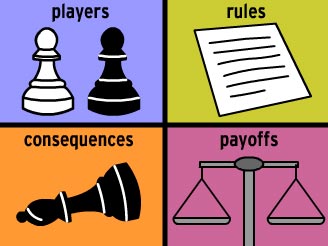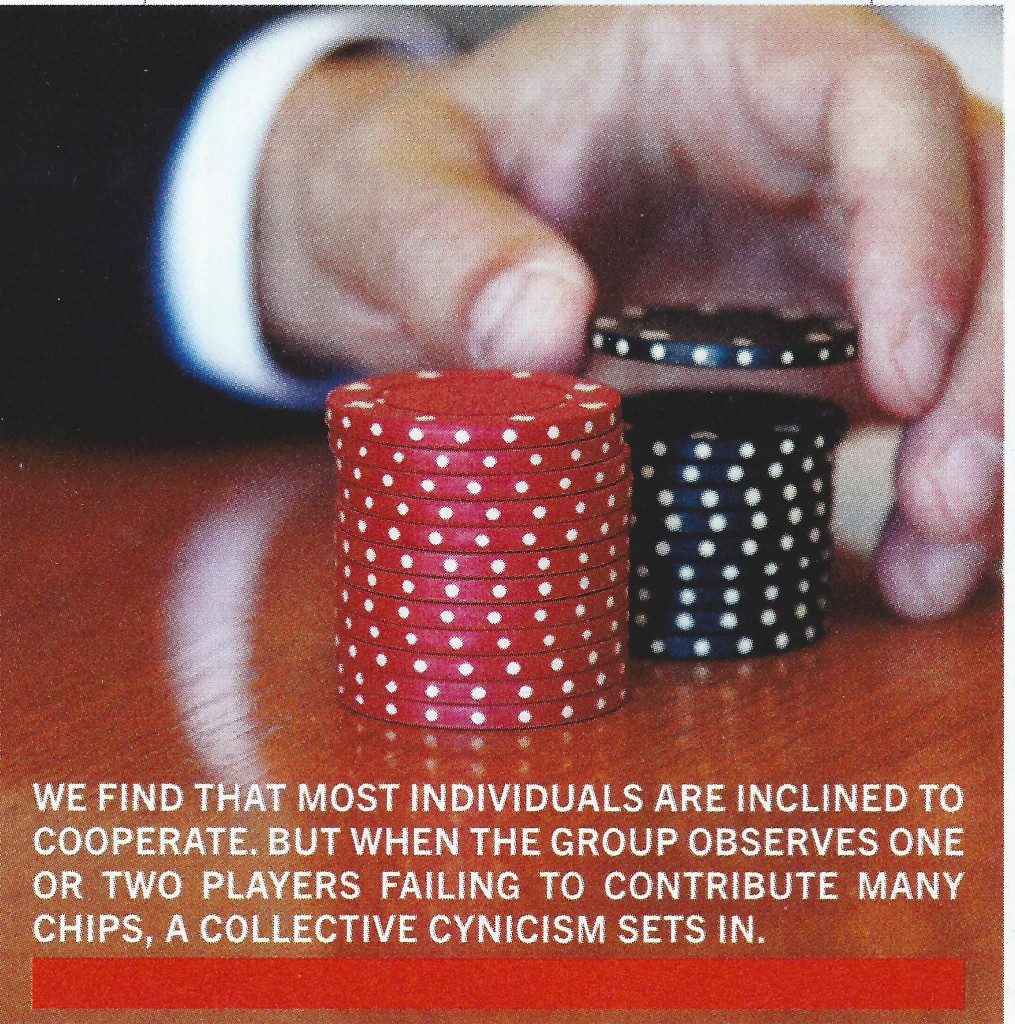Game Theory Applied to Climate Change Negotiations

As I draft this post, the climate talks in Paris are coming down to the wire.
In the Winter 2015 issue of “Columbia Magazine” is a piece where Scott Barrett, a professor of natural resources economics there, is interviewed. He’s internationally recognized for his application of game theory to the high-stakes business of climate treaty negotiations.
 Some baseline, first. Economics is a social science involving the study and measurement of ways people interact in various marketplaces of goods and services. Often small groups are studied, then added together towards a macro level of behavioral understanding. Here’s an opinion about the art of game theory.
Some baseline, first. Economics is a social science involving the study and measurement of ways people interact in various marketplaces of goods and services. Often small groups are studied, then added together towards a macro level of behavioral understanding. Here’s an opinion about the art of game theory.
At essence for the climate talks is formulating sensible incentives for individual countries to behave in fashion that spares the planet of the current warming trajectory, and all of its implications.
What Barrett does is to take the resultant treaties and model them as games.
 “The way our game works is that players are allotted stacks of poker chips worth a few Euros, which they can contribute to a central pot. They are at liberty to contribute as many or as few chips as they want. The cash award they get at the end of the game depends on how many chips they and their fellow players contribute. It also depends on whether the total number of chips exceeds a certain threshold that isn’t disclosed to the players. At worst, a player may end up with no award; at best, he or she might get close to €40. Players get more by holding onto their chips, but if the threshold isn’t reached, nobody gets the big prize. This threshold is supposed to represent the catastrophic outcome of ‘dangerous’ climate change. If countries contribute so little that they allow dangerous climate change to happen, the global community as a whole loses, and the biggest individual losers will be those who made a good-faith effort to save the world by contributing lots of their chips while others stood idly by, hoarding theirs.”
“The way our game works is that players are allotted stacks of poker chips worth a few Euros, which they can contribute to a central pot. They are at liberty to contribute as many or as few chips as they want. The cash award they get at the end of the game depends on how many chips they and their fellow players contribute. It also depends on whether the total number of chips exceeds a certain threshold that isn’t disclosed to the players. At worst, a player may end up with no award; at best, he or she might get close to €40. Players get more by holding onto their chips, but if the threshold isn’t reached, nobody gets the big prize. This threshold is supposed to represent the catastrophic outcome of ‘dangerous’ climate change. If countries contribute so little that they allow dangerous climate change to happen, the global community as a whole loses, and the biggest individual losers will be those who made a good-faith effort to save the world by contributing lots of their chips while others stood idly by, hoarding theirs.”
“We find that most individuals are inclined to cooperate. But when the group observes one or two players failing to contribute many chips, a kind of collective cynicism sets in, and group cooperation collapses. Then everybody loses.”
He goes on: “Pledging to reduce emissions is like pledging to contribute poker chips.”
A key observation about the game/the talks: “There is optimism among diplomats, environmentalists, and other observers that this process of naming and shaming will yield better results than did previous climate treaties.”
This brings to mind what you readers found to be a very interesting post on this blog last late winter, as measured by the number of views of it—the positive effect on unnamed neighbors when finding in their energy bills a comparative table of each other’s consumption. Also, as to lessons learned from earlier climate change negotiations, there won’t be shouting or name-calling by environmental activists who apparently have learned what’s helpful and what’s counter-productive.
Another interview question was: “Based on your research, what do you see happening in Paris?”
A- “I think it’s very likely that a treaty will be adopted and that it will include pledges to reduce emissions and some kind of review process. There are draft texts circulating now, and that’s what they look like. However, both the reductions and the review will be voluntary, and my research predicts that this won’t be enough to change how countries actually behave.”
Two more questions and answers. “Will India play the role of the free rider in this negotiation?
A- “India is preoccupied with what its leaders perceive as a historical injustice. They view rich countries as having gotten rich by burning fossil fuels, and now they are being told not to do that. Quite legitimately, they want to develop, too. There’s tremendous poverty there. The other side of it is that India’s population, like those of many developing nations, is especially vulnerable to droughts, floods, and other types of extreme weather events that will become increasingly common as a result of climate change. If we don’t get effective limitations, India will be a very big loser.”
“What would you suggest instead (of not bothering with it)?”
A- “The best way to address climate change may be for the countries committed to reducing emissions to shun the free riders and cooperate just among themselves.” [I’ve proposed] an approach “wherein countries with progressive emission policies offer others a comibnation of carrots an sticks, perhaps to include strategic trade measures, in hopes of broadening participation. That’s how the Montreal Protocol of 1997 worked.”
♠ ♥ ♣ ♦

This Just In– With the international climate summit negotiators reaching agreement, the 12/13/15 Washington Post reports that the issue of climate change/global warming “consistently ranks among the lowest priorities for American voters.” Thankfully, that appears to run contrary for many U. S. business leaders; particularly those running global enterprises like Goldman Sachs, Mars, Starbucks and Unilever.